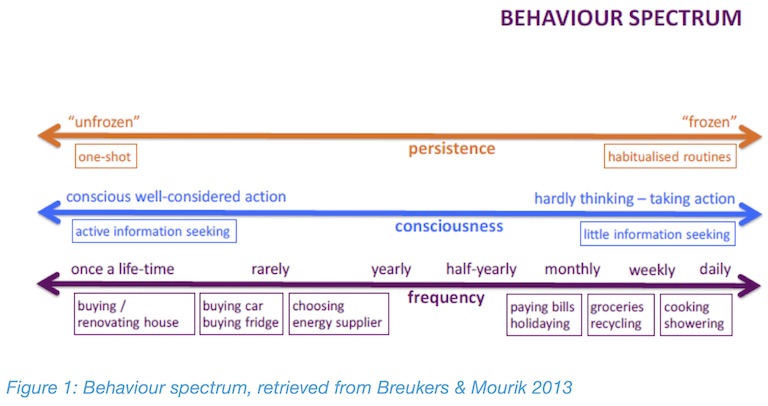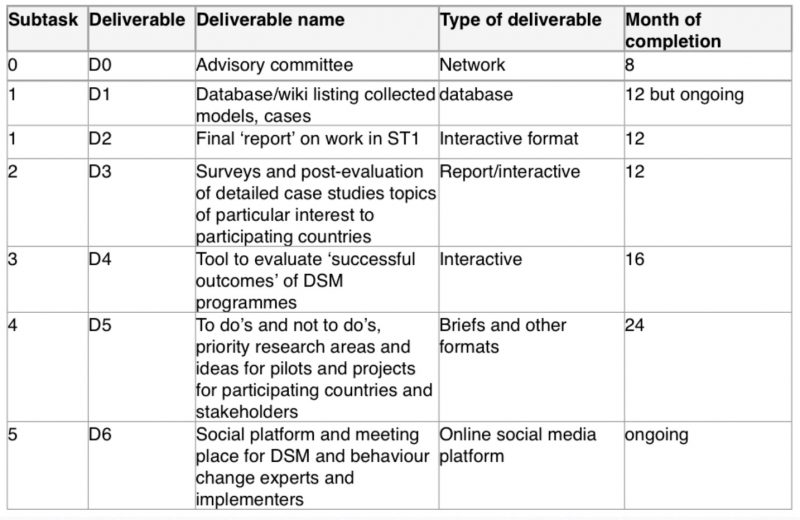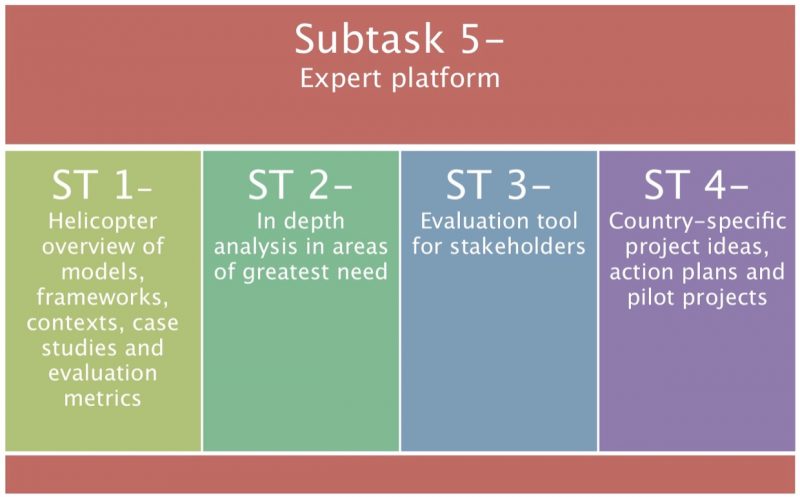
This Task focused on the complexities of human energy-using behaviour, looking at the individual, societal and whole-system perspective of energy use. Many global experts participate and help unravel these complexities in order to access the large end-user behaviour change potential for DSM programmes (estimated to be in the range of >30%). Once the ‘loop’ between different ‘Behaviour Changers’ (researchers, funders, policymakers, DSM implementers, and energy end users) is closed will this potential be more likely to be realised in practice.
Governments around the world struggle with achieving their targets towards developing a more sustainable energy system. There is now a growing international realisation that technological development will not be sufficient to meet those targets. Energy efficiency and energy conservation have gained renewed interest due to climate convention commitments and the rising concerns about prices and security of supply of imported fuels. They are the cheapest, fastest and most feasible way to meet climate change mitigation and pollution targets, mitigate impacts from resource constraints (peak oil and load), and improve health, comfort and energy security and affordability.
It is estimated that up to 30% of energy demand is locked in the so-called ‘behavioural wedge’. This ‘wedge’ includes peoples’ energy-using habits, as well as their purchasing decisions of energy (in)efficient technologies. The best ideas, policies, and programmes have failed again and again in achieving a lasting reduction of energy consumption. This ‘market failure’ of energy efficiency is often due to the vagaries of human behaviour and choice. Therefore, we believe that a better understanding of human behaviour in energy use is key to achieving a transition to a sustainable energy system.
We pose that a better understanding of the human aspect of energy use, including behavioural and societal drivers and barriers and external and internal contexts, will greatly improve the uptake of energy efficiency and DSM policies and programmes. This is not at all to say that technology, market and business models and energy supply are not hugely important aspects of the Energy System. Instead, we pose that the Energy System begins and ends with the human need for the services derived from energy (warmth, comfort, entertainment, mobility, hygiene, safety etc) and that behavioural interventions using technology, market and business models and changes to supply and delivery of energy are the all-important means to that end.
Language is hugely important, especially in the social sciences and we found that language (especially jargon) can also be a powerful inhibitor and creator of silos. Thus, in this Task, we have clearly defined some of the main terms we use in our reports:
Energy behaviour refers to all human actions that affect the way that fuels (electricity, gas, petroleum, coal, etc) are used to achieve desired services, including the acquisition or disposal of energy-related technologies and materials, the ways in which these are used, and the mental processes that relate to these actions.
Behaviour Change in the context of this Task thus refers to any changes in said human actions which were directly or indirectly influenced by a variety of interventions (e.g. legislation, regulation, incentives, subsidies, information campaigns, peer pressure etc.) aimed at fulfilling specific behaviour change outcomes. These outcomes can include any changes in energy efficiency, total energy consumption, energy technology uptake or demand management but should be identified and specified by the Behaviour Changer designing the intervention for the purpose of outcome evaluation.
Behaviour Changer is a person or agency tasked with the goal of designing, implementing, evaluating and/or disseminating interventions geared at changing energy end users behaviours. In this Task, we differentiate between five Behaviour Changer sectors: ‘the Decisionmaker’ (Government on all levels), ‘the Provider’ (Energy-providing industry on all levels including technology manufacturers), ‘the Expert’ (researchers and consultants from a multitude of disciplines especially economics, psychology, sociology and engineering), ‘the Conscience’ (the Third sector including NGOs, community organisations, transition towns etc.) and ‘the Middle Actor’ (the intermediaries selling energy-using goods and services who are directly in contact with the end users).
Demand Side Management relates to interventions (top-down and bottom-up policies, programmes and actions) developed and performed by Behaviour Changers (e.g. government agencies, utilities, DSM implementers) that seek to influence the ways in which end users consume energy at home, at their workplace or whilst travelling. The changes sought by Behaviour Changers may include the quantity of energy consumed for a given service, patterns of energy consumption or the supply management and type of energy consumed.
One-shot or investment behaviours are performed rarely and consciously e.g. investing in energy efficiency improvements.
Habitual behaviour is more frequent and less conscious, e.g. showering, changing the settings of the thermostat etc.
A DSM tool is used in DSM interventions to pursue a desired outcome (e.g. lowering or shifting energy demand). Examples of DSM tools are subsidies, mass media campaigns, energy labelling, regulation etc.

DSM aims at releasing the vast potential for cost-efficient energy efficiency that is locked in on the demand side (ie with the energy user). Releasing this potential however, proves very challenging, for various reasons:
One of the main challenges is that humans are often still regarded as economically rational actors whose behaviours can be influenced by fiscal incentives and information provision alone. However, the complexities influencing human behaviour are so vast and manifold that such simplistic approaches almost invariably fail. It is imperative to uncover the context-specific factors (from infrastructure, capital constraints, values, attitudes, norms, culture, tradition, climate, geography, education, political system, legislature, etc) that influence human behaviour, and design DSM interventions accordingly.
In addition, there are a large variety of research disciplines that endeavour to study human behaviour (social and environmental psychology, environmental and behavioural economics, anthropology, science technology studies, practice and innovation diffusion theory etc), each with their own models and frameworks, advantages and disadvantages. Unfortunately, they usually do not communicate well – not with each other and not with the end users of their research – the policymakers and DSM programme designers and implementers. This leads to confusion and lack of context-specific programme or policy design that is based on the best behavioural information or models.
Another crucial issue relates to monitoring, understanding, learning about and adapting initiatives in a more systematic manner. DSM projects demonstrate great diversity of goals, scope, participants, resources, etc to meet the diversity of implementing environments. As a consequence, developing a generic evaluation and monitoring framework that is widely applicable and does justice to this diversity is difficult. However, there is a real and urgent need for more appropriate and effective monitoring, evaluation and learning of successful DSM implementation.
In conclusion, there is no behaviour change silver bullet, like there is no technological silver bullet. Designing the right programmes and policies that can be measured and evaluated to have achieved lasting behaviour and social norm change is difficult. However, we believe that the time is ripe to bring together the world’s experts in research, policy and DSM implementation and share learnings, best practice and knowledge. Collaboration is often the key to better results, and this area of energy research is more dependent on collaboration and knowledge sharing than any other.
The main objective of this project is to create a global expert network and design a framework to allow policymakers, funders of DSM programmes, researchers and DSM implementers to:
Task 24 is aimed at developing a framework that clearly links behaviour change research theory with successful policy implementation and outcome evaluation. Incorporating solid behaviour change understanding into policymaking and programme design will result in a variety of multiple benefits, and insights into how to measure them:
Why participate in this Task?


The Task is broken into six distinct Subtasks, which follow a logical behavioural intervention structure:
1) Design Phase: behavioural research theory;
2) Implementation Phase: DSM best practice, case studies and learnings;
3) Evaluation Phase: ongoing outcome evaluation of actual changes in energy-using behaviours
4) (Re)iteration Phase: direct recommendations for participating countries including action plans of turning theory into practice (via Phase II);
5) Dissemination Phase: creating an international expert platform; conferences and workshops; blogs, articles, reports and peer-reviewed papers.

| Participating countries | In-kind support |
|---|---|
| Austria | Australia |
| Belgium | Canada |
| Italy | Portugal |
| Norway | South Africa |
| Sweden | Spain |
| Switzerland | UAE |
| UK | |
| US |
Task duration: June 2012 – May 2014
| Country | Name | Role | |
|---|---|---|---|
| New Zealand | Operating Agent | Sea Rotmann | drsea@orcon.net.nz |
| Netherlands | Co-Operating Agent | Ruth Mourik | ruth.mourik@duneworks.nl |
| Austria | National Expert | Gerhard Lang | lang@grazer-ea.at |
| Belgium | National Expert | Matthew Batey | matthew.batey@telenet.be |
| Italy | National Expert | Simone Maggiore | simone.maggiore@rse-web.it |
| New Zealand | National Expert | Janet Stephenson | janet.stephenson@otago.ac.nz |
| Norway | National Expert | Henrik Karlstrøm | henrik.karlstrom@ntnu.no |
| Switzerland | National Expert | Vincente Carabias-Hütter | cahu@zhaw.ch |
| Sweden | National Expert | Cecilia Katzeff | cecilia.katzeff@tii.se |
Phase I has led to over 45 publications, including (private) status updates and reports to the ExCo, Subtask reports, articles and peer-reviewed papers as well as workshop meeting minutes. Below you can find all of them.
Task 24 Phase 1 Legal Annex Text
Subtask deliverables
Other publications:
Workshop Minutes:
ExCo reports: